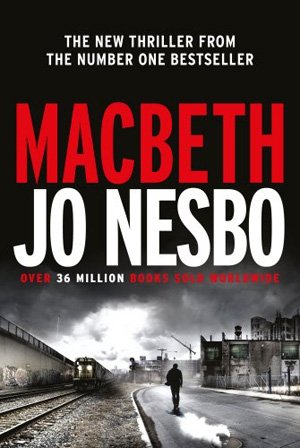 Translated by Don Bartlett — First performed in 1606, Shakespeare’s Macbeth is one of the best crime stories ever written. Okay, it’s not a whodunnit – we know early on who the culprits are – but to this day it gives us a wonderful psychological insight into the desires of men and women, and how power corrupts. It has been fashionable of late to reinvent Shakespeare’s works in a modern literary context, so who better to turn the Scottish play into a contemporary crime novel?
Translated by Don Bartlett — First performed in 1606, Shakespeare’s Macbeth is one of the best crime stories ever written. Okay, it’s not a whodunnit – we know early on who the culprits are – but to this day it gives us a wonderful psychological insight into the desires of men and women, and how power corrupts. It has been fashionable of late to reinvent Shakespeare’s works in a modern literary context, so who better to turn the Scottish play into a contemporary crime novel?
And, oh boy, does Ian Rankin… Oh, wait. Umm.. Yes, sorry, let’s reset.
As I was saying, who better to take this dark tale of murder, obsession and madness and turn it into a contemporary crime novel than Jo Nesbo, the Norwegian creator of the Harry Hole series? After all, the story has many of the ingredients that Scandinavian authors like Nesbo use so ably – moody weather, the dark and tragic portents of fate, a subdued but well defined psychological underpinning, and cold-hearted killing.
While the skeleton of the story remains more or less intact, the author has revitalised nearly every feature of it. Just as you will see Shakespeare plays transferred to a World War I setting, or even South Central LA, we descend as a raindrop into a Scottish town in the year 1970 as Nesbo’s opener gives us an early taste of the surreal, dreamlike atmosphere he has done so well in previous books. But a few pages in, the hard-edged action gets underway with a drug deal by the docks involving the Norse Riders, a notorious motorcycle gang. Macbeth is the captain of the unnamed town’s SWAT team and, as per the story, he valiantly takes down his foes… just about. This earns him promotion to head of organised crime by his grateful boss, the police commissioner, Duncan.
Lady Macbeth has been shortened to simply ‘Lady’ in this telling, a flame-haired former prostitute who now runs The Inverness, a high-class casino. Strega, a transgender acolyte of mysterious crime lord Hecate has whispered to Macbeth, who by the way is a recovering drug addict, that he won’t land long in organised crime and will soon be chief commissioner himself. At first he finds this very odd but Lady drives the point home, demanding that he murder Duncan. She’ll set it up right there in the casino by arranging a celebration and inviting Duncan to stay the night in a luxury room upstairs.
If you’ve read the play, you’ll know how things progress. Duncan is drugged, Macbeth nearly backs out, but eventually sets to work with his daggers, Lady covers his trail, and before police colleagues like Malcolm, Banquo and Duff realise what’s going on they too are on the kill list.
This retelling is full of dark, imaginative and fascinating detail, as Nesbo puts the architecture into place for his dramatic set pieces. The town he creates – based on Edinburgh perhaps, with Fife mentioned across the bridge – has all the dark, crosshatched shading of Sin City, as rendered in Frank Miller’s incredible graphic novel. Macbeth expands the power that so intoxicates him on several levels – politically in the town, organisationally within the police, and socially by brutalising his every friendship. There are showdowns with the mayor and with Hecate. There are Gatling guns, bombs and armoured cars. And, there’s a murdered baby in a shoebox.
It’s a lot darker and more troubling than the play…
It’s also a lot longer. Too long, in fact. Nesbo’s Blood on Snow and Midnight Sun demonstrated how poetic he can be. They have a slightly abstract feel to them, intense characters, and storylines that convey a rainbow of emotions in a compact 200 pages or so. Macbeth goes between being an intense page turner and a bit of a slog three or four times during the course of its 500 folios. The supporting characters have too much backstory, too much bad feeling, too many horrible flaws and secrets. Getting into all the nooks and crannies of Macbeth’s relationships with the other cops slows things down, and clouds our understanding of the main character rather than showing him in sharp relief. Is he how he is because of his background?
This Macbeth grew up in an orphanage alongside Duff, and they are the cops from the wrong side of the tracks. There’s a bit of a play on social class, but the way they speak is no different to the other characters. Macbeth, more than anyone, is given such stilted dialogue that he’s hard to read. Literally. Lady, such an icon in English literature, gets off to an impactful start as a strong woman and a femme fatale, but turns weird rather than sympathetic in her guilt, and eventually just fizzles out.
There are certainly long passages where Jo Nesbo is on form, grabbing you and drawing you in with car chases and gun battles here in this amazing, dystopian tract of retro Scotland. However, the book lacks its ‘Out, damned spot!’ moment and is probably one for fans of the author rather than a good introduction to his talents.
Check out our feature on 10 literary classics that are also crime novels.
Hogarth
Print/Kindle/iBook
£9.99
CFL Rating: 3 Stars









